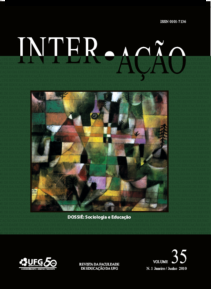PSYCHOLOGICAL ASPECTS OF LOGICAL -MATHEMATICAL REASONING IN PLANE GEOMETRY : A STUDY OF THE INFLUENCE OF CONTENT ON BUILDING INTELLIGENCE
DOI:
https://doi.org/10.5216/ia.v35i1.13142Keywords:
Epistemologia Genética, Modelos de Significação, Pensamento Lógico-matemáticoAbstract
The teaching of plane geometry in the latter years of Primary schooling is often bereft of meaning. Teachers opt for pedagogical practices based on algorithms, without any concern for the mental processes involved in the construction of geometric thought. This research had recourse to Genetic Epistemology to analyze how adults, who attended school and were successful at geometry, gave meaning to problems involving the calculation of the area and perimeter of plane figures. The data would indicate that all those interviewed were capable of carrying out calculations using algorithms, but few presented detailed explanations. The models of meaning vary substantially from thinking based exclusively on perception to a logical-mathematical explanation of the concepts involved.Downloads
Downloads
Published
How to Cite
Issue
Section
License
Inter-Ação uses the Creative Commons Attribution 4.0 License for Open Access Journals (Open Archives Initiative - OAI) as the basis for the transfer of rights. Open access means making documents available on the Internet free of charge, so that users can read, download, copy, distribute, print, search, or link to the full text of documents, process them for indexing, use them as input data for software programs, or use them for any other lawful purpose, without financial, legal, or technical barriers.
Authors publishing in this journal agree to the following conditions:
1) Authors retain copyright and grant the journal the right of first publication, with the work simultaneously licensed under the Creative Commons Attribution License, which permits redistribution of the work with attribution and first publication in this journal.
2) Authors are permitted to enter into additional, separate agreements for non-exclusive distribution of the version of the work published in this journal (e.g., for publication in an institutional repository or as a book chapter), with attribution and first publication in this journal.
3) Authors are permitted and encouraged to publish and distribute their work online (e.g. in institutional repositories or on their home page) at any time before or during the editorial process, as this may generate productive changes as well as increase the impact and citation of the published work.















